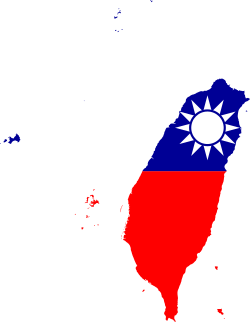Top Qs
Timeline
Chat
Perspective
Huadu (Taiwan)
Political movement regarding Taiwanese identity From Wikipedia, the free encyclopedia
Remove ads
Republic of China independence, abbreviated in Chinese as Huadu (Chinese: 華獨; pinyin: huá dú; Wade–Giles: hua2 tu2)[1] is a stance on the status of Taiwan that posits Taiwan and its outlying islands are presently an independent state (i.e. a distinct sovereign state from the People's Republic of China) under the name "Republic of China". Huadu supporters reject the One China principle, instead positing that:
- There is a Taiwanese state whose formal name is the Republic of China for historical reasons; and/or
- There are de facto two Chinese states which coexist as part of a unitary nation with both having the name "China" and de jure claiming sovereignty over all of China.
Thus, because the PRC and ROC are currently simultaneously extant and politically distinct entities, Huadu can be vaguely interpreted as a perpetuation of the status quo.
The Taiwanese nationalist movement is largely divided into Huadu, which favors retaining "China" as part of the Taiwanese state's formal name to maintain legal ambiguity over the political status of Taiwan; and Taidu (Chinese: 台獨 or 臺獨; pinyin: tái dú), a syllabic abbreviation of "Taiwan independence" (Chinese: 台灣獨立 or 臺灣獨立; pinyin: táiwān dúlì) that proposes a more radical departure from the status quo by making a formal declaration of independence to create a de jure "Republic of Taiwan", favouring total separation from China.[1] Huadu politics is generally favored by the moderate pro-independence Democratic Progressive Party (DPP)[a] while more radical groups such as the Taiwan Statebuilding Party and Taiwan Solidarity Union favor a declaration of independence. DPP politicians such as Lai Ching-te hold that Taiwan is already independent as the Republic of China.[3] DPP huadu supporters tend to see huadu politics as a pragmatic way to assert Taiwan's independence without unnecessarily aggravating the PRC government.[4][5]
In addition to independence activists, some politicians in the Kuomintang (KMT) party also support Huadu.[6] They generally oppose "one country, two systems" as well as further steps toward de jure independence.[7][8] 'Light blue' former KMT Chair Johnny Chiang insisted on the abolition of the 1992 Consensus which was based on "one China".[9]
Current ROC president Lai Ching-te, has said "Taiwan is already a sovereign, independent country called the Republic of China."[10]
Remove ads
See also
- Anti-communism in China
- Four-Stage Theory of the Republic of China
- Mutual non-recognition of sovereignty and mutual non-denial of authority to govern
- Pro–Republic of China sentiment
- Status quo
- Taiwan independence movement#Support for status quo
- Taiwanese Localism Front[11]
- Taiwanization
- Third Society Party
- Two Chinas
Notes
References
Wikiwand - on
Seamless Wikipedia browsing. On steroids.
Remove ads

